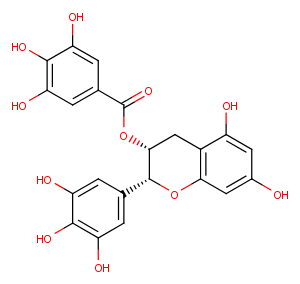(-)-Epigallocatechin Gallate
| Code | Size | Price |
|---|
| TAR-T2988-25mg | 25mg | £95.00 | |||||||||||||||||||||||||||||||||||||||||||||||||||||||||||||||||||||||||||||||||||||||||||||||||
| Special offer! Add £1 to your order to get a TargetMol CCK-8 Kit. Read more here. | |||||||||||||||||||||||||||||||||||||||||||||||||||||||||||||||||||||||||||||||||||||||||||||||||||
Quantity:
| TAR-T2988-50mg | 50mg | £107.00 | |||||||||||||||||||||||||||||||||||||||||||||||||||||||||||||||||||||||||||||||||||||||||||||||||
| Special offer! Add £1 to your order to get a TargetMol CCK-8 Kit. Read more here. | |||||||||||||||||||||||||||||||||||||||||||||||||||||||||||||||||||||||||||||||||||||||||||||||||||
Quantity:
| TAR-T2988-100mg | 100mg | £118.00 | |||||||||||||||||||||||||||||||||||||||||||||||||||||||||||||||||||||||||||||||||||||||||||||||||
| Special offer! Add £1 to your order to get a TargetMol CCK-8 Kit. Read more here. | |||||||||||||||||||||||||||||||||||||||||||||||||||||||||||||||||||||||||||||||||||||||||||||||||||
Quantity:
| TAR-T2988-500mg | 500mg | £186.00 | |||||||||||||||||||||||||||||||||||||||||||||||||||||||||||||||||||||||||||||||||||||||||||||||||
| Special offer! Add £1 to your order to get a TargetMol CCK-8 Kit. Read more here. | |||||||||||||||||||||||||||||||||||||||||||||||||||||||||||||||||||||||||||||||||||||||||||||||||||
Quantity:
Prices exclude any Taxes / VAT
Overview
Regulatory Status: RUO
Shipping:
cool pack
Storage:
-20℃
Images
Documents
Further Information
Bioactivity:
Epigallocatechol Gallate(EGCG) is an antioxidant polyphenol flavonoid that inhibits telomerase and DNA methyltransferase. EGCG blocks the activation of EGF receptors and HER-2 receptors. EGCG is a phenolic antioxidant found in a number of plants such as green and black tea. It inhibits cellular oxidation and prevents free radical damage to cells.
CAS:
989-51-5
Formula:
C22H18O11
Molecular Weight:
458.375
Pathway:
Microbiology/Virology; Immunology/Inflammation; Cell Cycle/Checkpoint; Apoptosis; Metabolism; NF-κb; Proteases/Proteasome; Autophagy
Purity:
0.9943
SMILES:
Oc1cc(O)c2C[C@@H](OC(=O)c3cc(O)c(O)c(O)c3)[C@H](Oc2c1)c1cc(O)c(O)c(O)c1
Target:
Ferroptosis; Reactive Oxygen Species; HIV Protease; Mitochondrial Metabolism; Endogenous Metabolite; Autophagy
References
1. Khan N, et al. Cancer Res, 2006, 66(5), 2500-2505.
2. Pae M, et al. Food Funct, 2013, 4(9), 1287-1303.
3. Steinmann J, et al. Br J Pharmacol. 2013 Mar;168(5):1059-1073.
4. Jin H, et al. Epigallocatechin gallate inhibits the proliferation of colorectal cancer cells by regulating Notch signaling. Onco Targets Ther. 2013;6:145-53.
5. Lu J, Lu Z, Liu L, et al. Identification of crocin as a new hIAPP amyloid inhibitor via a simple yet highly biospecific screening system[J]. Chemistry & Biodiversity. 2021
6. Zhou H, Ning Y, Zeng G, et al. Curcumin promotes cell cycle arrest and apoptosis of acute myeloid leukemia cells by inactivating AKT[J]. Oncology Reports. 2021, 45(4): 1-1.



